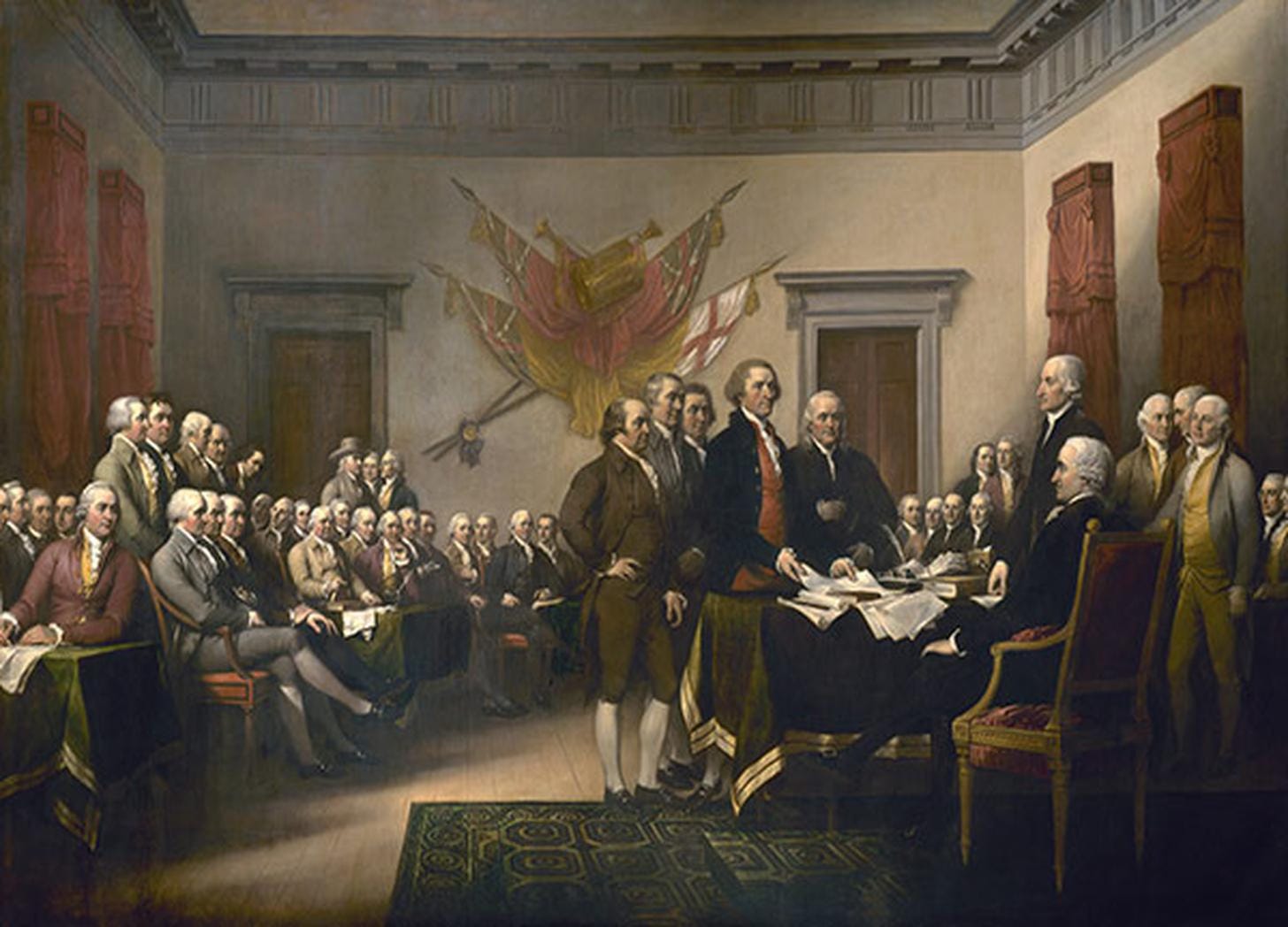Delegates to the Second Continental Congress, meeting in Philadelphia on the Fourth of July in 1776, issued a remarkable document, proclaiming the thirteen colonies in America to be free from British control. Fifty-six delegates signed a Declaration of Independence, famously stating: “We hold these truths to be self-evident, that all men are created equal, that they are endowed by their Creator with certain unalienable Rights, that among these are Life, Liberty and the Pursuit of Happiness.”
Friction with Great Britain had been festering and growing for several years leading up to the split. A decade before the Declaration was signed, Benjamin Franklin had warned the Brits against using their troops to quell unrest on colonial streets. The warning apparently went in one ear of King George III and out the other, because his troops fired into a protesting crowd in Boston on March 5, 1770, killing 5 colonials. That, plus “a long train of abuses and usurpations” resulted in the repudiation of royal control.
In addition to decrying the “establishment of an absolute Tyranny” over the colonies, the Declaration specified 27 grievances against the King’s arbitrary and dictatorial rule. They included his: obstruction of laws for naturalizing foreigners, obstructing the “Administration of Justice,” making “Judges dependent on his Will alone,” cutting off colonial trade with the world, exciting domestic insurrections, “imposing Taxes on us without our Consent,” and making the military superior to the “Civil Power.”
After winning our war for independence, the former colonies adopted a Constitution and Bill of Rights to prevent the dictatorial rule they had suffered under the King. First and foremost, all government power was to be based on the consent of the people. That power would be divided among three branches, with checks and balances to prevent an accumulation of power. Congress would write the laws, the President would carry them out and the Supreme Court would act as an even-handed umpire. We were to have “a government of laws, not of men,” as Founding Father John Adams put it.
Some of the substantial powers granted to Congress were specifically intended to limit the arbitrary actions identified in the 27 grievances of the Declaration. Congress, not the President, would have the power to control the nation’s purse strings, to set taxes and tariffs, to regulate foreign and domestic commerce, to organize a militia and set rules for utilizing it, to provide for our national defense, to declare war, and to enact a wide variety of laws “necessary and proper” for the “general Welfare of the United States.”
The Constitution was drafted in Philadelphia at the Constitutional Convention of 1787. As the ink on the document was drying, a woman asked Ben Franklin, “What have we got, a republic or a monarchy?” He replied, “A republic, if you can keep it.” Franklin was obviously not putting the onus on the lady, Mrs. Powel, to keep the republic. The “you” he referred to was all of us.
Franklin knew that future generations would lose this exceptional form of government if they did not work hard to keep it. It would take the same kind of unity, sacrifice and commitment that drove the Declaration signers to make the break with Great Britain. We can’t just sit on our hands and simply take advantage of our nation’s many blessings. Every citizen is obligated to contribute to the preservation of our democratic republic.
As it is, many of us do not understand our history or what motivated our ancestors to sacrifice so much to provide us with this remarkable form of citizen-directed government. Even our current President misunderstands the purpose of the Declaration, believing it to be a “declaration of unity and love and respect,” rather than an indictment of kingly despotism. Too many members of Congress do not comprehend the tremendous power and responsibility they possess to provide for the common good of all Americans. Either that, or they simply refuse to fulfill their constitutional obligation to faithfully serve the public. Too many Americans fail to keep informed on public affairs. Too few citizens vote. Few serve this great nation.
All of us should take a cue from those who signed the Declaration of Independence and pledge to do more to serve and improve our country. We can start this Fourth of July by reflecting on what each of us might do to make this a more caring and communal society and how we might enlist others, including those with whom we have political disagreements, in achieving that goal. That would renew the spirit of that first Independence Day in 1776.
About the Author
Jim Jones is a Vietnam combat veteran who served 8 years as Idaho Attorney General (1983-1991) and 12 years as a Justice on the Idaho Supreme Court (2005-2017).
Click this link for the original source of this article.
Author: Political Potatoes
This content is courtesy of, and owned and copyrighted by, https://idahoconservatives.com and its author. This content is made available by use of the public RSS feed offered by the host site and is used for educational purposes only. If you are the author or represent the host site and would like this content removed now and in the future, please contact USSANews.com using the email address in the Contact page found in the website menu.









